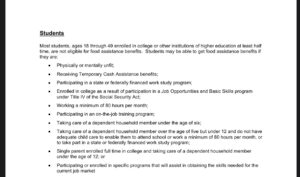
Three weeks ago, then-President Donald Trump increased Supplemental Nutrition Assistance Program benefits by raising allotments to 115 percent until June 30. Now, college students are applying to SNAP to receive the increase in food stamps and are getting denied due to a lack of job hours and being a full-time student.
The COVID-19 pandemic was discovered in December of 2019. SNAP began to increase recipient’s benefit amounts based on the household size in March of 2020. For a college student to be granted food stamps, students have to work a minimum of 80 hours per month, be physically or mentally unfit, or take care of a dependent household member. SNAP failed to realize that college students are struggling as much as families.
Florida Governor Ron DeSantis believes raising the allotments to a 115 percent policy will help families eventually get back to normal.
“With nearly three million Floridians participating in SNAP, I’m confident that these policy initiatives are in our state’s best interest — they will help us safely and gradually re-establish normalcy and ultimately allow families to thrive post-COVID-19. These timely and proactive efforts taken by DCF helps ensure the good people of Florida have access to the support and resources they need,” DeSantis said after announcing the extended support to Floridians in April.

Many college students have monthly car notes, car insurance, rent, and cell phone bills to pay. During this time, college students are also in a bind. They either have to choose their bills over buying groceries, buy groceries and lack the funds to pay for their bills, or starve. College students are young adults who need the same support and resources that families are receiving.
Take Taylor Williams, a criminal justice major at Florida State University who believes it’s unfair how SNAP is set up and denying students who can’t work as much due to their dedication to their schoolwork.
“The process for applying for stamps was straightforward. There was an online application to fill out background information about myself and my financial status currently. My initial application was denied due to me being a full-time student and not having a job that equals 80 hours a month. I feel it’s unfair to those who take so many hours at school that they might not have time for a job. But I have rent to pay, car insurance, phone bill, and medical bills I have to pay out of pocket since I don’t have healthcare. Some people don’t deserve food stamps, and they lie on their applications or have a lot of kids that they don’t even take care of properly with the government help they received. Yet a college student who works hard in school and has so many other bills to pay can’t catch a break with a little help from food stamps, even if it’s just $50. I wouldn’t ask for much, just a little something to help with the load,” Williams said.
The SNAP eligibility for students has become difficult and has caused many students to give up on attempting to get SNAP because of the many times they have been denied.
Senior business FAMU undergraduate, Jordan Ashely, shared his experience when filling out the SNAP application and how it affected him once denied.
“The SNAP application starts with telling them simple information about yourself. Then it goes into giving them information about the jobs you do work for, which I found weird due to them wanting to know how much a person gets paid before tax deductions because that’s not the amount I’m bringing home. Also, I didn’t work as often these past months due to COVID, but I thought when they ask the question about me being a full-time student. I would at least receive a few food stamps. When I received my SNAP letter, they denied me because I’m a full-time student and not working the required hours. I needed those food stamps, SNAP was my last result, and they failed me,” Ashely said.